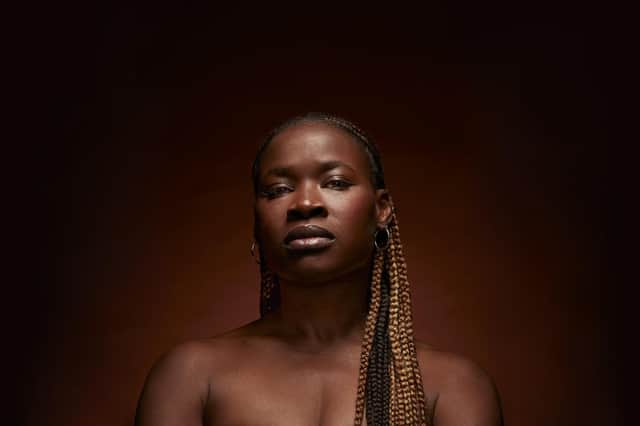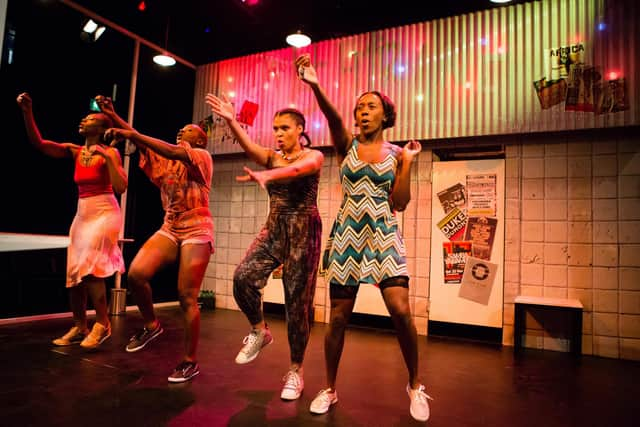Adura Onashile is exploring evil from a woman's point of view in Medea at the EIF


Strange theatre fact: the play which has won the most Tony Awards for Best Actress in the history of Broadway is a play which was first performed in 431BC. Euripedes’ Medea continues to inspire theatre-makers, perhaps because of the enigmatic woman at its heart. Depending on your point of view, she’s a witch, a child-murderer or simply a wronged wife who’ll stop at nothing to get revenge.
“It was always a dream to play a part like this,” says Adura Onashile, during a break from rehearsals for the National Theatre of Scotland’s production for Edinburgh International Festival, which revives Liz Lochhead’s Scots version. “The scope, the complexity: can you ever really know a character like Medea? It’s like peeling off the layers of an onion. Of course you’re daunted, but it’s also an adventure and a risk.”
Advertisement
Hide AdGlasgow-based Onashile had been focussing on writing and film-making, but when the audition came up she couldn’t resist. “I was just excited to meet Michael (Boyd, the director) and enjoy Liz’s language, so I decided to give it my best shot. To get the part was a dream come true.”
Medea has burned her bridges to marry Jason (he of the Golden Fleece), her lover and accomplice. But, after ten years, he discards her and their children to pursue the daughter of the King of Corinth. Revenge ensues and the bodies pile up; Medea poisons not only Jason’s bride-to-be, but also her own children.
“We don’t allow women to commit evil acts,” says Onashile. “It feels like Medea is the one character who is able to explore that from a woman’s point of view. That feels really important. So much of our socialisation as women is about being likeable, not being able to show our anger. I think we are fascinated by a woman with that much power.”
But Medea’s unthinkable act is also born of a sense of powerlessness. “This is a woman who is cornered. It’s a misogynistic society. Her choices are very very few. She homes in on her agency, what she has power to do. The journey of the play is to understand - not to condone, but to understand - why she behaves the way she does.”
Talking about it is one thing, but Onashile has to make that journey, emotionally, every night. “For me as a mother, I can’t personally go to a place where I think of killing my child on a nightly basis to play this part. I don’t think it’s a healthy thing to do. So for me it’s about understanding the nature of her rage. I’ve been trying to explore anger, the ways I have been allowed or not allowed to express anger. Medea allows herself to feel the extent of her rage in a way that I would be very scared to in my own life.”


Onashile started out in dance and physical theatre before training as an actor. After finding that the parts she was being offered as a black woman were limited, she moved into making her own work. She wrote and performed HeLa for the Fringe in 2013, the story of Henrietta Lacks, a black woman from Baltimore whose cells were harvested without her consent in the 1950s and led to important advances in medical science.
Advertisement
Hide AdIn 2016, her play Expensive Sh*t, the story of a Nigerian bathroom attendant in a Glasgow nightclub, was performed at the Traverse – Scotland’s first all-black, all-female play. It won a Fringe First and attracted the attention of Glasgow-based film producers Barry Crerar who invited Onashile to turn it into a short film, which was nominated for a Scottish BAFTA. Her first feature, Girl, backed by BFI, BBC films and Screen Scotland, was filmed during the second lockdown and is now in post-production.
“It’s not that I made a conscious choice to leave acting, it was more that I wanted to explore creating my own work and then that took over,” she said. “I’ll never ever stop loving theatre. But as something to explore and develop, film feels very exciting to me. I also think I’m seeing characters of different backgrounds, different sexualities, on film and TV that I’m not necessarily seeing in theatre - yet.”
Advertisement
Hide AdShe knows the stories she wants to tell, stories about women, and voices recovered from the past. In 2021, she made Ghosts, an immersive augmented-reality walking tour of Glasgow which explored the city’s connections with the slave trade. I make the mistake of calling them ‘untold stories’. “The thing is: untold to whom? I’m interested in stories that are far away from me but also close to me. Those stories have different bodies and different sexualities and different experiences in them, but they’re all tied, in one way or another, to the way I see the world and who I am in the world. Maybe I just want to tell stories.”
Her feature film, Girl, is partly inspired her own story, her close relationship with her mother, a single parent. “I thought my mother was the sun, the moon, the stars, everything. I relied on her to such an extent that when I had to go out into the world I found it a little bit hard. In the film, I push that dramatically, but I wanted to explore that dynamic.”
Making a film in lockdown was, she says, the hardest thing she’s ever done. “It was a heavy brew of stress and intensity. But it was a labour of love, and I’m really proud of what we’ve done. I’ve never seen anything quite like it, and I really hope we are able to share it with the world.”
Chosen as a ‘Star of Tomorrow’ in 2021 by Screen International, she is entering an industry with shockingly few women auteurs, and still fewer women of colour. “I often put myself in situations I’ve never been in because I like that, I like to take risks and push myself. But that often means I’m in situations where I’m an anomaly: there’s a way of doing things, and you challenge that just by the very fact that you’re different. It’s been hard, I can’t lie.” A taxi driver who picked her up from the shoot one day was adamant she was a costume assistant. “He could not fathom that I was the writer-director of a feature film!”
Now, she brings that same energy, generosity and determination to a difficult woman written in 431BC. “You know, Medea would approach the challenge of playing her by saying ‘I’m just going to throw myself at it, I’m going to give it my all, and just have faith that I get to the end’. I’m going to channel some of her energy.”
Medea, The Hub, Edinburgh, 10-28 August. www.eif.co.uk